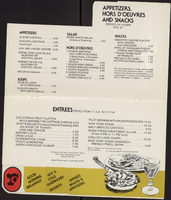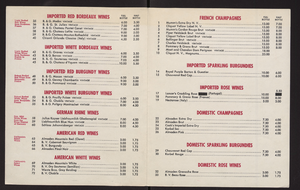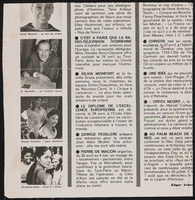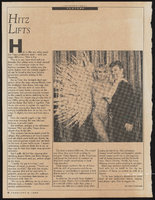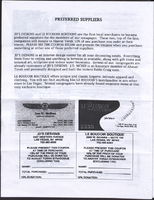Search the Special Collections and Archives Portal
Search Results
Bob Stoldal Collection of Nevada Sheet Music
Identifier
Abstract
The Bob Stoldal Collection of Nevada Sheet Music (approximately 1865-1995) contains the personal sheet music collection of Las Vegas, Nevada newsman and historian Bob Stoldal. This collection also contains digital scans of the sheet music covers.
Archival Collection
George Ward oral history interview
Identifier
Abstract
Oral history interview with George Ward conducted by Charles P. Hall on March 11, 1978 for the Ralph Roske Oral History Project on Early Las Vegas. In this interview, Ward discusses moving to Las Vegas, Nevada in 1942 and his experience in the city as an African American. Ward describes the jobs African Americans were hired for in Las Vegas during the 1940s and his teaching career. He describes segregation and discrimination in the school system and in casinos. He also talks about how African American police officers were only allowed to patrol West Las Vegas, housing availability, and organized crime in the city. Lastly, Ward talks about his involvement in local politics, the beginnings of the University of Nevada, Las Vegas, and the development of Las Vegas.
Archival Collection
Si Zentner Collection of Music Scores
Identifier
Abstract
The Si Zentner Collection of Music Scores consists of copyright agreements and original music scores from the career of musician Si Zentner. The manuscripts span from 1957 through 1996.
Archival Collection

Transcript of interview with Otto Merida by Claytee White, May 18, 2017
Date
Archival Collection
Description
When looking back on his legacy in the Latinx community of Las Vegas, Otto Merida (1945 - ) takes great pride in being a Latin Chamber of Commerce [LCC] co-founder with Arturo Cambeiro. With the LCC, they forged a powerful economic entity that continues to provide the local Latino community with social and political influence. Growing up during the 1950s in Havana, Otto Merida fondly remembers his childhood despite living under the dictatorship of Fulgencio Batista. There were the murmuring sounds of explosions from afar on the way to baseball games, but also the warm Sunday family meals of Cuban soup with fideos. In this interview, he talks about the rising communist powers inspired by revolutionary Fidel Castro and the events that led his family to place him in the Peter Pan Program in 1961. The Peter Pan Program sent unaccompanied Cuban children to the United States to avoid potential instruction by Castro’s government. Merida still holds on to his mother’s final request upon leaving Cuba-“I want you to remember the address where we live and the phone number: Josefina 68-entre primera y segunda-La Víbora, Havana con el teléfono X4304.” As a part of the Peter Pan Program, Merida experienced a nomadic childhood living in barracks in Miami and a three-story home in Wilmington, DE. The only connection he had to his family were a series of letters he exchanged with his mother, until they reunited years later in Miami. For Merida, life on 79th Street and Biscayne Boulevard in Miami was defined by the values of his family and other Cubans and African Americans in his neighborhood. v Merida earned his bachelor’s degree in Political Science from the University of Florida. He credits his sister-in-law with a pivotal role in his decision to pursue a higher education. His engagement in politics continued through his involvement with the Cuban Circle, the first Hispanic community to be involved with politics in Las Vegas. He describes the migration of Cubans to the casino scene of Las Vegas and the presence of Cubans in the community. His work with the Cuban Circle inspired him to develop a political presence for Hispanics in the community. While travelling across the United States before settling in Las Vegas, Merida made many significant relationships while working with associations such as the Fitchburg Chamber of Commerce and Volunteers in Service to America [VISTA]. Living in Las Vegas, Otto Merida worked as an educator and community organizer. In the late 1970s, Merida and Arturo Cambeiro collaborated to create the Latin Chamber of Commerce of Las Vegas. For Merida, the Chamber consistently goes above and beyond the vision he and Cambeiro had created when they first opened their doors. From the creation of the Latino Youth Leadership Program at UNLV to their work alongside political figures such as Senator Catherine Cortez-Masto, Merida is extremely proud of the various accomplishments of the Chamber. Now as President Emeritus, Otto Merida continues to dedicate himself to the Chamber as a volunteer and serves as one of the many Latinx Voices of Southern Nevada that have shaped the greater Las Vegas community.
Text
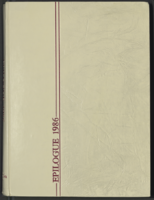
Epilogue: UNLV Yearbook, 1986
Date
Description
Yearbook main highlights: schools and departments; detailed lists with names and headshots of faculty, administration and students; variety of photos from activities, festivals, campus life, and buildings; campus organizations such as sororities, fraternities and councils; beauty contest winners; college sports and featured athletes; and printed advertisements of local businesses; Institution name: University of Nevada, Las Vegas
Mixed Content

